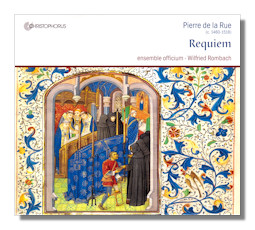
The Internet's Premier Classical Music Source
Related Links
- de la Rue Reviews
- Latest Reviews
- More Reviews
-
By Composer
-
Collections
DVD & Blu-ray
Books
Concert Reviews
Articles/Interviews
Software
Audio
Search Amazon
Recommended Links
Site News
 CD Review
CD Review
Pierre de la Rue

Requiem
- Missa pro Defunctis
- Missa de Beata Virgine
Ensemble Officium/Wilfried Rombach
Christophorus CHR77386
The singing on this CD containing Pierre de la Rue's (c.1460-1518) two Masses, "pro Defunctis" and "de Beata Virgine" is careful, studied, dignified, slow-paced and altogether pointed. At first blush it may seem a little too precise, lacking luster and life. Yet listen through to the sublime last notes of the "Beata viscera" [tr.16] and you're likely to feel, instead, that you've been handed a gently-crafted chandelier which quickly presents a wealth of light of its own; sees no need to shimmer; yet by its immobility can and will go on illuminating indefinitely.
By the time we reach the "Offertorium" [tr.4] and the number of singers increases, the breadth, rather than individual or particular points of de la Rue's writing is revealed; and ensemble officium commends to us the idea that effect should take second place to component. Hence the intimacy and precision of their enunciation and phrasing under Wilfried Rombach. That care is just what's needed; it works very well.
The Elector of Saxony, Frederick the Wise (1463-1525), modelled music making at his court on other Burgundian courts where choirs expressed opulence and a commitment to music; and that of Emperor Maximilian I in particular. He owned choirbooks which contained music from the great composers of the time including Josquin, Isaac and… de la Rue. We know little about the latter. He did spend most of his productive life singing in the Grande Chapelle of the Burgundian court in Brussels and at the court chapel of Margaret of Austria in Mechelen, though. There he seems to have been a favorite among the many composers of whom Margaret was patron.
The music of each of these works is intensely polyphonic. This befits the tone of adoration (for the dead and the Virgin) of a culture on the brink of the Reformation – which Frederick in major part sponsored intellectually. At the same time, the writing is lucid and pure. And these are some of the qualities which ensemble officium prizes and successfully conveys on this CD in addition to unobtrusively exposing the sheer beauty of the writing.
The Requiem, Missa pro Defunctis, is more doleful than the Missa de Beata Virgine. But the latter – perhaps because of the aforementioned precision with which ensemble officium sings – is far from an (empty) outpouring of joy. It's serious. One can be forgiven for concluding that de la Rue was in general a serious composer. Neither melancholy nor even truly dour. But weighty (without being ponderous), genuine and as full of consequence as he seems to have striven to espouse real purpose. For so is his music here.
At the same time, there are moments of sheer delight… throughout the "Graduale" [tr.11], for example, a moment when one would perhaps expect more function than euphoria. But it's to the credit of these singers that they are able to balance such emotions as genuine joy with, say, the surprisingly rather bleak, wintry tone of the "Credo" which follows. Once again, it's their understanding of the essence of the music and its liturgical breadth and dynamism that makes this such a successful hour of music-making. You may even conclude that de La Rue has as much to offer as do Josquin and Isaac.
The church acoustic is perfect for this accentuation of the texts, and not any kind of ensemble "wash". It's on the dry side. But with the very forward miking of the 16-strong choir (not all sing on all tracks), the result is as crisp and communicative as Rombach's conception of the works and performances. There's also a warmth in the way the voices are projected. The booklet contains an essay by Rombach on sacred music at the Court of Frederick the Wise, and the full texts in Latin, English, French and German.
There are several other recordings of the Missa pro Defunctis, but only one (Preiser Records 265) of the Missa de Beata Virgine. This is as good as any of them. If this is repertoire that delights (as surely its purity and clarity must), or intrigues for the ways in which modern performances can indeed bridge the apparent gulf between the distant pride of the late Medieval/Early Renaissance worlds and the uncertainty, perhaps, of our own, then do not hesitate to look at this compelling release, actually a re-issue from 2005. Warmly recommended.
Copyright © 2014, Mark Sealey


















